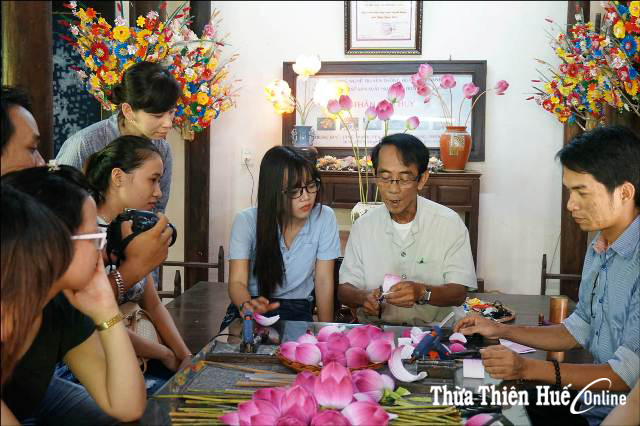Many craft villages and handicraft works in Hue have so far taken interest in researching, designing and promoting their products.

Painter and artisan Than Van Huy is teaching people to make paper lotuses.
Efforts to promote their products in Thanh Tien paper flower village and Sinh painting village in Hue have proved successful, attracting a number of clients with lots of opportunities for tourist development. Indeed, foreign tourists are very attentive to recognizing, designing and promoting trademarks.
Sinh-Village folk paintings and Thanh Tien paper flowers are cultural products with more than 400 years of existence. They are ranked among the traditional folk values of Hue. However, over time, social changes have exerted some negative effects on them. The promotion of those products is regarded as very necessary, making them more widely known to the society and become the typical symbols of Hue people's spiritual life, meeting the demand of the marketplace.
While Sinh-village paintings are to be burnt as offerings, Thanh Tien paper flowers are kept on the altar until the end of the year. Therefore, there must be appropriate ways of promotion to satisfy not only those who buy the products for their worship but also tourists who purchase them as souvenirs. The maker and designer hence must make their products in a way that both abides by people's beliefs and culture and contains Hue typical cultural values.
In recent handicraft designing contests of Thua Thien-Hue Province, Sinh-Village folk paintings and Thanh Tien paper flowers have by and large left better impressions. Unconventionally, products have been made not only by craftsmen in the villages, but also by artists, both amateur and professional, and students. In 2014, the painter and lecturer Nguyen Thi Thanh Tra employed the theme of Bat Am (Eight Sounds) of Sinh-Village paintings in her product of paper lantern and won the second prize. Her paper lanterns have now obtained a stable position in the marketplace. Its production has been now expanding with hundreds of new and varied models and designs.
The success of Nguyen Thi Thanh Tra has urged many students to research and design other handicrafts as souvenirs. Some students have succeeded in creating products with Hue identity on the basis of Sinh-Village folk art. The posters of Nguyen Thi Hien Trung and Dang Thien Ha, and the cover design and content pages of the students from the Faculty of Applied Arts served as positive suggestions for the promotion of Sinh-Village folk paintings.
The fact that many students took part in promoting Sinh-Village paintings and Thanh Tien paper flowers both on and off campus proved their interest in researching and accessing the spiritual values of the two craft villages. It was the students that chose the images and methods to conduct their projects. On the process, they developed a clearer understanding of the traditional culture in general and that of the craft villages in particular and were well aware of the cultural and spiritual values of a line of folk painting and a typical paper flower village.
500 copies of the combined brochure for both craft villages containing pictures, notes, guidelines and general descriptions have been delivered for free at Sinh Village. All tourists who happened to visit Sinh Village at the time wanted to possess a brochure from which they were instructed to the nearby Thanh Tien paper flower village, just one km from Sinh Village.
Similarly, during a week, all 500 brochures at Thanh Tien paper flower village were distributed. Obviously, brochures proved efficient in introducing tourists and visitors to the two craft villages. Tourists were very excited about it. 50 visitors from Lycoming College in America all chose 50 brochures as meaningful souvenirs to bring back home.
It is essential that promotion should contribute to introducing the local history and culture, which serves as the foundation for trademark promotion and the historical and traditional basis for the two craft villages. Visitors can thus understand in more depth the traditional cultural values of Thua Thien-Hue Province.
Story and photo: Phan Thanh Binh